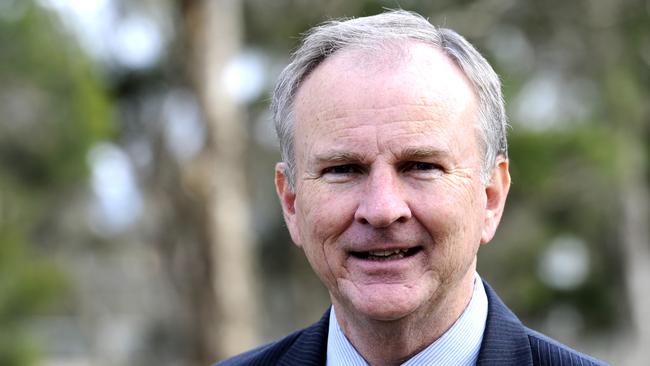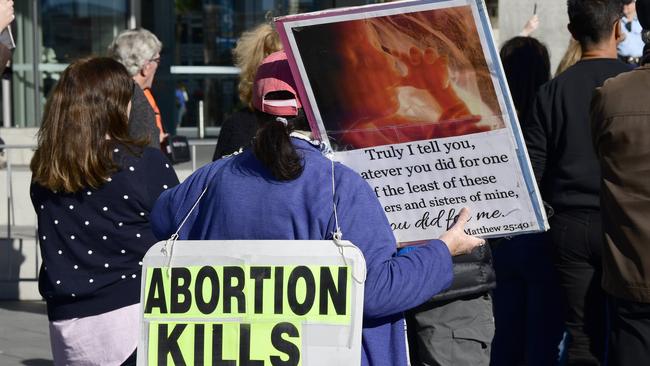Kevin Conolly: This abortion bill is not empowering anyone
Even those who support decriminalising abortion should not support this very bad bill before parliament, writes Kevin Conolly.
Opinion
Don't miss out on the headlines from Opinion. Followed categories will be added to My News.
- Premier Gladys Berejiklian forced to address abortion bill debate
- Abortion bill: MP Kevin Conolly proudly pro life
The abortion bill before the upper house in NSW parliament has been sold by those pushing it as a bill to “decriminalise” abortion. It’s not just that, or even mostly that.
More dishonestly still, it’s been titled the “Reproductive Health Care Reform Bill” even though it doesn’t even address reproductive health and certainly does not reform the way health care is provided to patients.

If the aim was just to “decriminalise” abortion, that is to remove the possibility of criminal penalties applying to a woman or a doctor, a very different bill would have been presented.
That aim could have been achieved by just amending the Crimes Act, which is a small part of what this Bill does, and making no other change.
But there are many other changes in this bill.
Why?
In reality, the bill is about making abortion more readily available, including at all stages of pregnancy, with virtually no checks and balances, and with no measures to support a woman’s choice to do anything other than proceed with an abortion.
MORE OPINION:
Wake up and smell the reality — drugs kill people
Farmers condemned to drought’s death row
It’s a dangerous time to be a Christian
If the aim was to “translate” the status quo arising from case law into statute law in order to provide clarity and certainty about what has been lawful since 1971, then the current case law test would have been written into this bill. But it hasn’t been.
As a result, actions which are illegal today could become legal if this bill passes in its current form.

That’s why many of the strongest objections to the bill arise from what is NOT in it, and what would become possible as a result of such omissions.
The community has learned recently that there is no prohibition in the bill on selectively choosing abortion on the basis of the gender of the child.
Experience in other jurisdictions shows that unborn girls are far more likely to be the victims of this practice than boys.
It has also become clear that in other jurisdictions babies born alive as a result of attempted abortions have been left to die in the operating theatre rather than rescued.
There is no prohibition on this abhorrent practice in this bill.
This bill would strip away the existing case law criteria for an abortion to be lawful.
Since 1971 the case law has been that an abortion is lawful if a doctor honestly believes it to be necessary to protect the woman from a danger to her physical or psychological health, and that the danger to be avoided is proportionate to the measure taken to avoid it (i.e. the abortion).

These criteria have led to a higher threshold to be met for late term abortions to be lawful than early term cases.
In removing these criteria this bill would therefore lower the threshold for late term abortions. In fact all it requires is that each of two doctors “consider” all the circumstances and “considers … that the termination should be performed”.
The legal test of lawfulness is therefore the subjective opinion of two doctors, with no objective criteria to be satisfied.
If there are two equivalents of the pro-euthanasia Dr Philip Nitschke in NSW, who passionately believe that abortion should be available on demand, then those two could legally perform abortion in any circumstances.
Why should the law of the state depend on the opinion of individual doctors? And why should the bill open the door for more late term abortions when there is ample evidence that the people of NSW want a higher bar set for late term abortions, not a lower one?
Another omission is that the bill does not prohibit the sale of human tissue from aborted human beings. This is despite evidence that this practice occurs elsewhere in the world.
Nor does it create an offence of coercing a woman to have an abortion.
Surveys show that many women in Australia report having experienced coercion from a partner or family members.
If this bill is supposed to be about giving women choice, why is there no ban on coercion?
At first the bill did not even include any suggestion that counselling be available to a woman seeking an abortion. An amendment to ensure every such woman was offered counselling was moved in the lower house and defeated by the proponents of the bill.

A weaker amendment allowing the doctor to decide whether or not to offer counselling to a woman was carried.
How does this empower or support women experiencing a critical moment in their lives?
Finally, for a bill which is presented as simply “decriminalising” abortion, why is there a new obligation to be placed on doctors who have a conscientious objection to abortion to facilitate the process?
Has anyone demonstrated a problem so severe and so urgent that it could only be solved by the extreme measure of forcing a person to act against his or her conscience?
These aspects of the bill all go way beyond the stated aim of “decriminalising”. They could be resolved by way of amendments without compromising that stated aim.
Many amendments will be moved in the upper house to address these obvious shortcomings in the bill.
It is my sincere hope that the upper house will adopt amendments to bring this bill back into line with community expectations.
As the bill stands it is an extreme widening of the scope of lawful abortion, amounting to abortion on demand with no support or protection for a woman who may be considering any other option.
It is a bad bill, even by the standards of those who would support decriminalisation.
Kevin Conolly is the state member for Riverstone.
